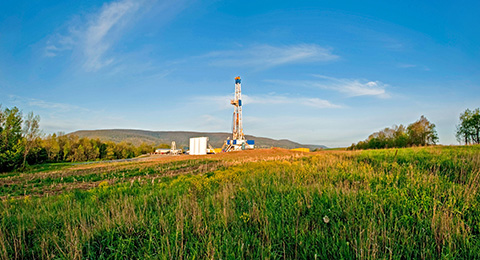Managing and Reducing Waste
Our exploration and production operations inherently generate wastes such as drill cuttings, produced water and containment fluid, which are characterized as non-hazardous. We work to minimize this waste through reuse or recycling, and responsibly dispose of remaining materials.
Each operating area has a waste management plan that lists waste generated, waste characterization, on-site management requirements and best practices, and approved waste disposal vendors. Each plan is reviewed and updated at least annually to address changes to state regulations, operations and vendor capacity. Chesapeake also conducts due diligence on each vendor and landfill.
Our waste and operations teams implement innovative reduction and recycling solutions such as:
- Treating and reusing produced water
- Implementing closed loop drilling systems, which decrease liquid waste (and entrained solid waste) by recycling drilling fluids
- Facilitating drilling programs with longer lateral lengths, in part to reduce surface disturbance and cuttings
- Implementing an enterprise-wide battery recycling program
- Offering an office supply exchange and recycling program on our corporate campus
- Composting and recycling at our corporate headquarters restaurant
Hazardous Waste
Under the EPA’s Resource Conservation and Recovery Act (RCRA), facilities determine their regulated generator status based on monthly rates of hazardous waste generation. Under normal operations, all active Chesapeake facilities are classified as Very Small Quantity Generators and generation rates are monitored to verify this status. Less than 1% of Chesapeake’s generated waste meets the RCRA hazardous criteria.
NORM Waste
Our HSER and Operations teams partner to measure the level of NORM on all locations using specialized radiation survey equipment. This data is then used to implement appropriate safe work practices, including the use of specially licensed and trained professionals for handling and disposal. Chesapeake also follows the As Low As Reasonably Achievable (ALARA) radiation protection standard, the guiding principle of radiation protection across the globe.
Business Waste
Our office locations produce a limited amount of waste, primarily paper, plastic, electronic and battery. We recycle these materials by partnering with entities that specialize in their disposal. For example, we collect batteries on our corporate campus and in our field locations before sending them to a national collection firm for recycling and recovery of usable materials.
In 2023 and 2024, we expanded our composting program at our corporate restaurant to include both cooking waste and consumer food waste. Last year we diverted more than six tons (more than 12,000 pounds) of waste from landfills.


